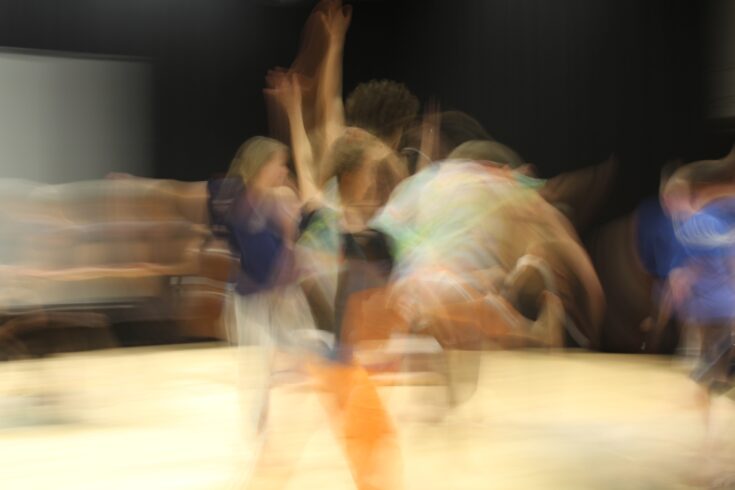Earlier this year, the national Let’s Dance campaign saw dance events mounted across the UK to inspire everyone to embrace dance to improve their health, connect with others, and have fun.
I went to my local theatre and saw young dancers, all ages, mixed abilities, delight in taking the stage and dancing confidently and energetically.
I saw adults of all ages right up to 70 plus who choose to make time to dance as a social, creative and recreational activity.
The group showed how dance can be joyful, hopeful and give meaning to their lives.
Fearless, bold expression through dance
I saw a workshop for people with Parkinson’s disease led through a beautiful collective dance. It shone a bright light on how dance can transform a prognosis of reducing mobility to a place where experiencing community and shared identity becomes a place for fearless and bold expression through dance.
Two hours of dance that is replete with material that has and will continue to stimulate important research enquiries across diverse areas, within and beyond the arts and humanities.
So, to quote Lewis Carroll, ‘Will you, won’t you, will you, won’t you, will you join the dance?’
Whilst dance is not for everyone, dance provides pleasure for many. Whether through developing a career as a professional performer, choreographer, producer or aligned with the creative arts and industries in multiple fields, as an audience, or as participant to experience the joy and liberation that dance can provide.
Dance is making a difference
But dance is also making a difference in and because of research in myriad ways.
Dance connects us with our lived human experience, how our bodies move, feel, touch and age: we dance through our life’s journey.
Dance research is as valid and rigorous as research into writing, drama and any other artistic practice but has its own specific outcomes.
Dance research also builds productive alliances with our stakeholders, including policymakers, creative sector professionals and other researchers.
New discoveries through dance
Moreover, dance is also changing research in other fields. New discoveries emerge through bringing dance experts into contact with health professionals, engineers, computing scientists, lawyers, psychologists, and the list goes on.
Copyright law
For example, dance informs how copyright law needs to rethink ideas about authorship and ownership in artworks where claiming ‘originality’ can be challenging for dancers looking at ownership, and by extension, copyright protection in their work.
The body
Dance research also expands ideas about liveness, neuroscience and cognition. It shows how knowledge that is generated and expressed through the body extends computational processes where data is embodied, directly impacting on public engagement with dance history.
Health professionals
Dance research has developed new methods for health professionals to collaborate with dance experts to support those living with various health conditions, including those with chronic pain or neurodegenerative diseases.
Data
Dance research promotes ethical and responsible methods for recording and sharing data generated by human motion, showing how expert knowledge of dance may shape our application of and engagement with intelligent systems.
Environment
Dance research may be conducted in different site-based locations. It shows us how to respect our environment, awakening our sensorial experiences of the world around us and how feeling in confederation with all other living forms supports methods for addressing the global climate crisis.
Collaboration
Dance researchers are thus also strategic and value opportunities to work in collaboration to promote a rich research ecosystem whereby dance research contributes to the broader science agenda.
Pushing the frontiers of knowledge
Fundamental research is pushing the frontiers of knowledge when dance brings the human back to the centre of research. It helps us to see the world differently, influencing and refining methods that seek out truths by pointing to the contingent and evolving nature of human experience.
Researching dance means exploring how dance creates individual and community identities; how dance transmits and reveals our cultural heritages.
Research also offers ways to examine how dance may heal the wounds of historical and contemporary political movements that can rupture societies. This can be seen, for example, in projects that employ arts-based methods to engage audiences in discussions about sexual and gender-based violence, or where dance supports social integration.
Dance research shows how dancing is a source of knowledge that draws communities together and strengthens those seldom heard, hard to reach, less visible.
Impact of dance research
The impact of dance research can be measured in the vast numbers of people who participate in and benefit from the research as well as in the contribution that dance research makes to the knowledge economy.
The work ahead is to build on those stories of social and cultural impact to generate the data that will also evidence the economic value of dance research.
In short, dance research is making a difference in multiple fields, creatively addressing some of the world’s major challenges whilst feeding our senses through exquisite art.
Dance research brings people together in a shared experience that promotes deep thinking about equality, diversity and inclusion, improving the policy landscape for our creative partners and supporting the growth in the creative industries.
Dance is gentle, fierce, dynamic, spectacular, subtle, extraordinary. Dance shows us how to be careful and respectful in relation to others.
And that is why dance research matters.



